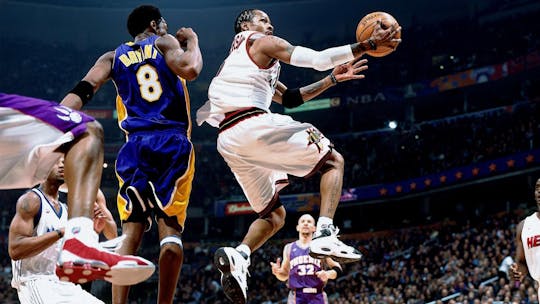Twenty years ago, the NBA All-Star Game showcased such a competitive display of talent that it instantly became one of the most memorable games in the last two decades. The 2001 All-Star Game, which was was the 50th edition of the annual event, was held in Washington D.C.
It was an exhilarating showcase that featured a spirited 21-point comeback in the final nine minutes with the East winning over the West, 111-110. Allen Iverson earned MVP honors, scoring 15 of his 25 points in the fourth quarter. It was the first time since 1977 that the exhibition game was decided by a single point.
Let’s revisit the 2001 classic that’s considered by many as one of the best All-Star Games ever.
The star-studded lineups
The selection of All-Stars usually represents a particular era of basketball. 2001 was still a time of the bully ball, post plays, and dominating big men. However, the game was slowly moving towards a perimeter-oriented style and it was spearheaded by transcendent guards like Allen Iverson, Vince Carter, and Kobe Bryant. Even legendary big men Kevin Garnett and Tim Duncan weren’t your traditional power forwards. The 2001 All-Star Game was a transition, so to speak, exhibited by the lineups of the two squads.
EAST: Allen Iverson, Tracy McGrady, Vince Carter, Ray Allen, Allan Houston, Stephon Marbury, Jerry Stackhouse, Anthony Mason, Glenn Robinson, Latrell Sprewell, Antonio Davis, Dikembe Mutombo (Injured: Grant Hill, Alonzo Mourning, Theo Ratliff)
The East was led by a 25-year-old Iverson in his prime. He had the full package of killer crossovers, suicide drives to the paint, and a seemingly reckless abandon of his pint-sized body. He had the signature cornrows and arm sleeve too. AI’s tenacity was what fueled the East despite their lack of size against the giants of the West.
Ray Allen, Stephon Marbury, and Carter were rising stars then. They brought the hops, the shooting, and the swagger for the undersized East squad. Tracy McGrady was still with the Orlando Magic at this point, and although he was already a scoring dynamo, we all found out that he had another gear when he got traded to the Houston Rockets.

WEST: Jason Kidd, Kobe Bryant, Chris Webber, Tim Duncan, Michael Finley, Gary Payton, Kevin Garnett, Karl Malone, Antonio McDyess, Rasheed Wallace, David Robinson, Vlade Divac (Injured: Shaquille O’Neal)
The first major takeaway about this team is the joining of forces of some of the game’s best big men. C-Webb, Duncan, KG, and Sheed all in one team? Incredible. Shaq was sidelined due to injury, but imagine if he suited up. It was also a bit of consolation for the East that David Robinson and Karl Malone were already at the curtain call of their playing days and hardly saw minutes.
Kobe, meanwhile, was merely 22 at the time but he was at the peak of his high-flying days. He was brimming with confidence having won his first title with the Lakers the year prior. This was a young, cocksure, and willing-to-take-on-the-world Kobe and it showed with how he carried himself on the floor amongst older and more experienced peers.
The West’s commanding lead
The West opened with an 11-0 outburst, which made it seem like it would be another blowout All-Star Game. West coach Rick Adelman unleashed 6-foot-10 Webber, 6-foot-11 Garnett, and 6-foot-11 Tim Duncan for most of the game (KG replaced Shaq as a starter). The three power forwards were on top of their game, all similar in stature but with varying skillsets. Amazingly, all three ended up with 14 points each and combined for 27 rebounds.
Both the East and West often threw the ball in the post, with a power forward or center backing his way for a hook shot or a mid-range jumper. Seeing KG, Duncan, Big Dog Glenn Robinson, and Antonio McDyess battle felt like watching bumper cars go at it in a theme park. Compared to 2021 where four or five players usually stretch to the 3-point line, the floor looked incredibly cramped back then.
The West capitalized on their size advantage early and continued their dominance through three quarters. It also helped that Michael Finley was hitting shots and a sprinkle of points also came from McDyess, Robinson, and Vlade Divac.

The East’s comeback
The piece de resistance of the 2001 All-Star Game was the 21-point comeback by the East. The West built a comfortable 95-74 lead with nine minutes left as the game was headed for a lopsided result.
But then, Allen Iverson happened.
The Answer stared down the West’s gigantic lineup and relentlessly attacked the rim. He unfurled his unique layup package, and when he couldn’t get the basket, he still ended up shooting from the free throw line. The East also received timely shooting from Ray Allen and Allan Houston, which allowed them to slowly creep back into the game.
The East also had another trick up their sleeve with Dikembe Mutombo, who single-handedly changed the game on the defensive end. The guy was either deflecting or altering shots as the West suddenly struggled to score. He stood his ground against the formidable frontline of the West and ended up with a monster line of six points, two steals, three blocks, and 19 rebounds (Interesting to note that Mutombo played in the ASG as a member of the Atlanta Hawks. Less than two weeks later, Mutombo was traded to the 76ers to join forces with Iverson and East head coach Larry Brown.)
The final three minutes were especially riveting when the score was finally tied. The West went with their starters of Kidd, Bryant, Webber, Duncan, and Garnett while the East took the unconventional route of Iverson, Marbury, Carter, McGrady, and Mutombo. If you think about it, the East let loose a modern-day small-ball lineup with McGrady and Carter matching up with Webber and Garnett. Coach Brown went with athleticism and speed to try to counter the West’s size and it turned out to be a brilliant move.
Clutch moments
The West tried to continually go into the post late in the fourth quarter but in the final minute and a half, they went to Kobe. The young and soon-to-be Black Mamba hit two clutch jumpers to give his side a 108-105 lead before Marbury answered with a booming triple to tie the game. Kobe went into his bag one more time as he converted another jump shot over the outstretched arms of 7-foot-2 Mutombo.
Marbury immediately went back to the other end and rose up for another 3 to give the East a 111-110 advantage with 28.4 ticks left in what became the game-winning basket. What made that entire sequence extra compelling was the fact that there was neither a foul nor a timeout called since Kobe hit his first clutch J. It was back-and-forth mayhem basketball.
There was eventually a pause in the action with 10.9 seconds on the clock after the East issued a foul to give. After a West timeout and the game on the line, Kobe had the ball in his hands. Kobe, hounded by Marbury, used a pick from Duncan at the top of the key. A shot fake got Marbury off his feet, but Mutombo frantically challenged after. Kobe was forced to whip the ball to Duncan who came up short. Webber’s last-second putback was also unsuccessful.
The East celebrated like they won the championship with players hollering and jumping all over the court. The ending was a sprint and the East fittingly celebrated like they were the kings of the basketball world.
The aftermath
In the last 20 years, there have been 11 All-Star Games that were decided by five points or less, including the 2003 edition that went into double overtime but ended as a 10-point win for the West. It wouldn’t be far-fetched to say that the reason fans continually long for a competitive All-Star Game is because of that iconic contest two decades ago.
This doesn't mean that previous editions of the ASG weren’t competitive, but the ’01 game bore a little more weight because it served as the middle ground between the old and new styles of play: from the rough post-up plays in the 90s to the iso-heavy perimeter style and beyond. It was post-Michael Jordan and pre-LeBron James. It was the time of young and up-and-coming game-changers in Iverson and Kobe.
Twenty years later, the 2001 NBA All-Star Game is still a must-watch for any fan of the game.




